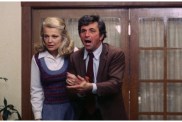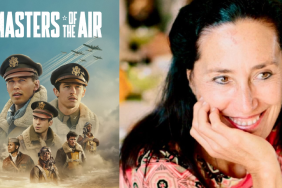Although actress Sally Hawkins appeared in many of Mike Leigh’s films, she got her big break when he cast her as the interminably-cheerful Poppy in his 2008 comedy Happy-Go-Lucky, a role that won her a Golden Globe and numerous critics awards.
After brief appearances in An Education and Mark Romanek’s Never Let Me Go, Hawkins returns in another high-profile leading role in Nigel Cole’s Made in Dagenham, playing Rita O’Grady, one of many hardworking women at the Ford auto plant who went on strike in 1968 to protest against the lower pay they were receiving for the same amount of work as the men. At a time when women were seen as lesser than the opposite sex, the women brought production at the Ford plant to a stand-still getting enough attention it led the British government to institute the Equal Pay Act of 1970.
Ms. Hawkins hadn’t been feeling well on the designated days to do press for her movie, but she graciously made time later in the week to talk on the phone with ComingSoon.net. Of course, we wanted to use the opportunity to ask about Mike Leigh, being that he wasn’t in the room to scowl at the insolence of our question.
ComingSoon.net: I spent some time talking to Nigel earlier this week and he mentioned that you both came on board around the same time?
Sally Hawkins: No, I knew I was doing it before I met Nigel. Steven Woolley and Liz Karlsen came to me quite early on, and I knew as soon as I read their letter and read a very early draft that I wanted to do it, and at that point, we didn’t really know who was going to be directing it. Then I was introduced to Nigel and really loved him instantly, so I came to it at quite an early stage and I had no idea if it was actually going to become a reality like a lot of projects, they can sadly not even make it further to a second draft. I was just very lucky, we all were, that it actually happened.
CS: It’s a great story and as Nigel said, it’s not something that was very well known even though it only happened 40 years ago. What jumped out at you when you first read the script that made you want to play Rita?
Hawkins: Initially, I read the letter that was a summary of this woman and what she went through with her friends and her co-workers and I read a very early draft like I said. The fact that it’s set in reality and it’s a piece of history that I had no idea about, and I loved that. It’s happened and it’s real, these women existed and still exist today, and it’s something that not many people know about and like Nigel said, we just weren’t aware that these women were influential and were the catalyst for the Equal Pay Act of 1970, and that’s phenomenal. I just loved the passion of Rita, the script is brilliant, very clever, and the way it ties in her domestic life, her everyday life at home with her children and her husband and seeing the issues that she was dealing with professionally and in the public eye, how they were being mirrored in her home life, and I loved that. I loved the relationship of the women, this real camaraderie and the friendship, and it made me cry. The script made me cry. It’s one of those scripts you read and your heart starts to race and it really fires you up. I was very moved and it touches issues that relates to all of us, and that we all are passionate about, because it captured something almost primitive. It’s not even specifically about women, it’s about being a human being in a way. I was very moved and I was really flattered that Steven Woolley and Elizabeth Karlsen thought of me.
CS: I assumed you met with the actual women, so at what point did you want to meet with them and how much time did you spend with them?
Hawkins: Because you don’t know whether it’s actually a reality, like I said, you have it in the back of your head, then they say, “They’ve got the money and we’re ready to go.” Because there is never enough time to prepare for these things, but I wanted to meet the women, just for me. It was something that I wanted to do and made sure that happened, and the production team were kind enough to set it up and these women wanted to speak to me. I met three of them and I’m so glad I did. It was only 40 minutes of their time, and it was a cup of tea and I met them in Dagenham–they still live there and they’re still friends–and I’m so glad that I did that now, because it’s kind of key. I knew that without meeting them, I wouldn’t really have had an insight into the way they are. In the tiniest things that you don’t quite know what you’re picking up or what you’re taking when you’re meeting people that you’re representing in a film that actually exist, but I was just grateful to meet them and touch base with them and to hear their stories, that was what was key for me to hear directly from the people that were actually there what it was like. That was invaluable really. I loved their camaraderie and they were very funny with each other. They were warm each other and still very good friends, but also, they were very smart. You could tell that they just don’t suffer fools, and they obviously work incredibly hard, their family were very important to them, and it still is, and that’s what I took from that meeting. The fact that they were just doing what they had to do and what they had to say, and it was very simple. What I loved about them was the fact that they didn’t really understand why it took so long for people to understand (laughs) and I love that. They said, “It’s just quite simple. This is what we were, and it was wrong that we had not been given or been treated in an equal way up until this point, but now it’s time to readdress the balance, and unless that is done, we’re not going to shut up.” And that was the message I got when I walked away from that. It’s very simple, I love that simplicity, and just very down to earth. There’s no stuff and nonsense, no frills, that’s just how it is. I love that. (laughs)

CS: I think one of the reasons why I liked the movie and why most people enjoy it is that it’s a serious story but there’s a great deal of humor in it. Were you looking for movies like that? Nigel said that he likes making movies that allow him to go back and forth, rather than specifically a comedy or drama.
Hawkins: I do love that in film. For me, I got into acting through comedy. It was just an extension of trying to make my friends laugh, I think (laughs). I know in life it’s both serious and funny at the same time, simultaneously. People are funny, and in the most tragic situations, when comedy erupts from nowhere, it can turn on its head within the space of a second or a minute. You’re laughing one minute and you’re crying the next and that’s just life for me, and that is what people are like. They’re both serious and you can’t second-guess life. It will always be surprising you in the best ways an in the worst ways. The people I love to be around are the ones that treat life with humor, because it can get all quite serious and it is tough, but when you have those people around you that can really just release something in you and make you smile in those situations, those are the ones to keep (laughs) and those are the ones who survive, I think. The people I greatly admire in life are the ones that can make people smile in the most horrific times when life is treating someone badly. You need people like that and I’m always drawn to them. For me, personally when I’m watching a film, it just adds a definite humanity, because you can relate to it when you treat things with humor, it goes straight to our hearts in a way that an intellectual concept can’t sometimes.
CS: Would you say that’s Nigel’s greatest strength as a filmmaker that he’s able to mix those two things or what would you say is his greatest strength?
Hawkins: I think Nigel’s got lots of strengths and he has a great eye, and I love the fact that Nigel… I didn’t see him in a box that way. I don’t see him as having one particular strength over another. What I love about Nigel is that he just wants to learn and still wants to learn and I love that about him. He’s not set in any particular genre or doing any one particular kind of film. He has a great sense of humor himself, and he’s quite droll, and when he talks, it’s like Mike Leigh, he has such a great sense of humor and that’s just shown up in his films. You’re aware of Mike’s view of life because of the humor that comes through his films, and I think similarly, Nigel has a very dry sense of humor and I think he’s really drawn to people that lighten the spirit and lighten the world and about characters that can do that. It’s such a gift for people to do that, and I think he obviously values that as well and wants to embrace it. I think Nigel’s wonderful. He has this ability to step back when he needs to and he trusted me, and I’m so grateful for that, because that’s the ultimate for a director is that trust. When a director trusts you, you feel so confident in order to do what you do, and give them what they need, and that’s a real gift.
CS: Do you know how long you’ll be doing “Mrs. Warren’s Profession” on Broadway?
Hawkins: Until the end of November.
CS: Do you have any idea what you might do next or are you going to wait until after the holidays to do another movie?
Hawkins: I don’t know. I would love to stay here and do another Broadway show. (laughs) There are a few options in the air but at the moment, I have no idea. I quite like not knowing what I’m doing for months and months. I can’t really plan that far ahead, but at the end of November, I’ll be unemployed so we’ll see what happens. (laughs)
CS: Oh, I’m sure you’ll get more work. Since I spoke to you last time I had a chance to talk to Jim Broadbent and Lesley Manville about Mike Leigh’s new movie. I was really fascinated by it, since they gave a lot more insight into that experience, and I was curious if you were able to bring stuff you learned while working with Mike to movies like this or is this a completely different experience and approach?
Hawkins: Well, Mike’s way of working is very particular to his way of making films. Unless all the other actors are doing the same discipline, it’s very hard for you to bring it something else. Of course, it does make you change the way you approach things. I’m so in debt to Mike and so thankful to Mike for my first experience and my introduction into film. My first film role was “All or Nothing” with Mike Leigh and I’m so grateful that I had that learning from very early on. It was a great training if you like (laughs). What I remember and what I actually know now is truth and so right is that Timothy Spall said to me very early on during the rehearsal process of “All or Nothing,” he said Mike Leigh will change the way you see and nothing will be the same again when you go into another production, and it’s true. You can’t help but carry some of that need for detail or richness to create that world, because there’s never enough preparation, and also, I really enjoy it. I love that way of working. I love the detail and the detail is what makes it real for me. I love creating and I love knowing what books surround my character, what images they’re seeing or what music they like or what TV shows they’re watching or authors they’re reading, whether it’s in the ’60s or whether it’s Lizzy Warren, what books she’s reading or who she’s aware of, what icons she had in her life. I love that detail. For me, it really helps me, but I know a lot of actors that don’t, and I really value that as well. I think there are so many ways of getting to the same point, and there are so many different roads, and I don’t think one is better than another, but for me, at the moment, I really love that way of working. With Mike, it’s sort of an exception, because you have six months rehearsal as I did for “Happy-Go-Lucky” in order to build up that character and their relationships, and actually it’s not that long a time when you realize the fact that you don’t have a script and you have to create all that from nothing. Actually, when you think of how long it takes for a script to be developed in the usual conventional way of making films, six months isn’t very long. When you’re going into other films and you’re given a script and you’re given a character and you’re told which shoes to stand in, and you’re not working with the production designer on such details, because you don’t have so much time, so you have to sort of concentrate all that you’ve learned into the space of sometimes just a matter of days and try and put in as much work as you can in those limited circumstances. It’s always different with every single thing you do, but there are things you drop along the way and you pick up different skills and then you think, “Well, that will work for this and that won’t perhaps work for this because I haven’t got the time in order to do it, so I’ll just trust instincts.” There are very different skills, but I do love that luxury of time and really putting in that groundwork. I think it really reaps rewards at the end of the day.
Made in Dagenham opens in New York and Los Angeles on Friday, November 19. Look for our video interview with director Nigel Cole sometime later this week.









